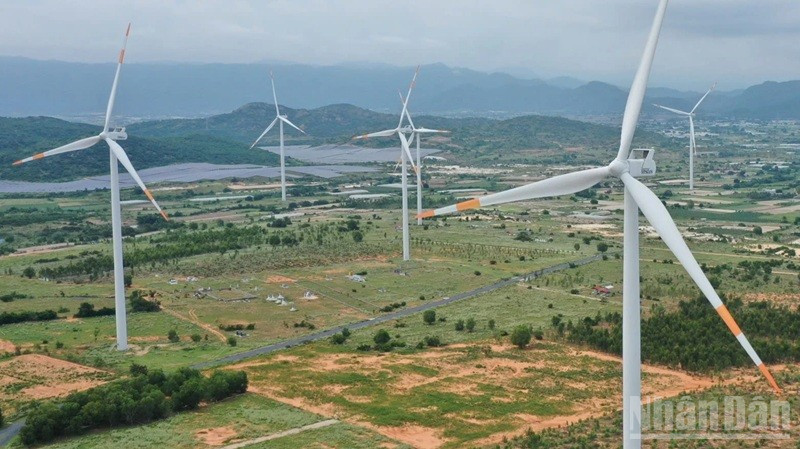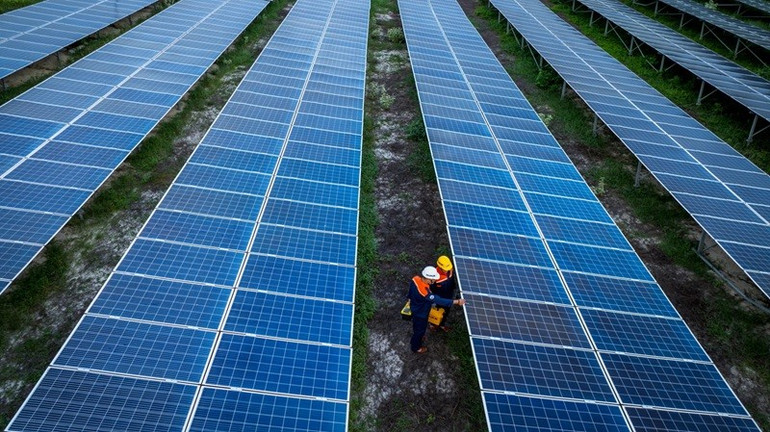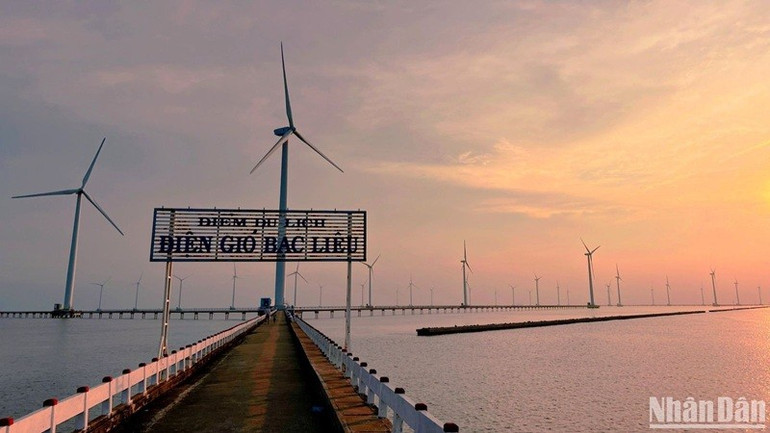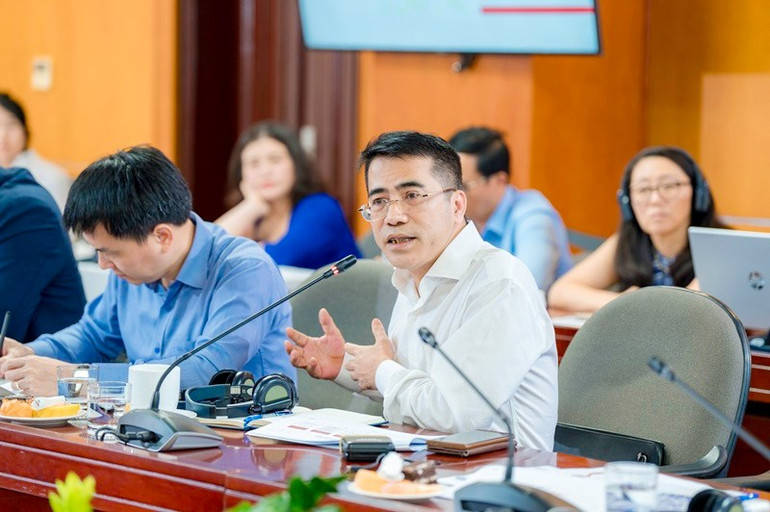
Focusing on renewable energy considered right direction for sustainable energy transition (Photo: VAN DUY)
Developing renewable energy clusters
According to the National Power Development Plan for the 2021-2030 period, with a vision to 2050 (National Power Development Plan VIII), Vietnam aims to build 2 inter-regional renewable energy industrial and service centers.
These centers will be the convergence of many key activities, including power generation from renewable energy sources, manufacturing renewable energy equipment, green hydrogen production, developing logistics infrastructure for the offshore wind power industry, supplying necessary supporting services, forming green industrial parks, as well as promoting research, development and human resource training.
According to the Ministry of Industry and Trade's proposal, the northern renewable energy center will be located in localities such as Hai Phong, Quang Ninh, and Thai Binh, with the possibility of expanding to neighboring areas in the future.
This center will include facilities for wind and solar component manufacturing, logistics services, and specialized seaports to support the construction, operation, and maintenance of renewable energy projects. In addition, there are green industrial parks, low carbon emissions, and facilities for research and specialized workforce training in clean energy.
Similarly, the southern hub is expected to be located in the areas of Ninh Thuan, Binh Thuan, Ba Ria–Vung Tau, and Ho Chi Minh City, which have outstanding potential for wind and solar power as well as port infrastructure.
To realize this strategic vision, the Ministry of Industry and Trade established a delegation in September 2024, within the framework of the Just Energy Transition Partnership (JETP). The delegation is co-chaired by the Electricity Authority (under the Ministry of Industry and Trade) and the German Embassy, with the mandate to promote strategic planning and the development of renewable energy hubs.

Workers maintaining solar panels at Phong Phu solar farm (Solarcom). (Photo: GIZ)
As an important initial step, the Energy Support Programme (ESP) of the German Agency for International Cooperation (GIZ) has implemented a survey study of existing renewable energy center models in the world, aiming to provide reference information and share international experiences for the idea of building a renewable energy industrial and service center in Vietnam.
The study, titled “Developing a Vietnam Renewable Energy Center - International Case Studies: Some International Experiences Focusing on Offshore Wind Power”, focuses on building a domestic offshore wind power value chain as a basis for forming renewable energy centers synchronously and systematically.
The objective of the study is to provide a foundation for planning and implementing future renewable energy hubs. This includes selecting suitable locations for expanding the domestic value chain, defining key components of the integrated hub model, and developing a policy framework to support the deployment of these hubs in Vietnam.
International experience cited in the report indicates that renewable energy manufacturing is rarely concentrated in a single location. Instead, successful renewable energy hubs often develop as flexible regional industrial clusters.
In these clusters, original equipment manufacturers (OEMs) play a central role, and tier-2 and tier-3 suppliers develop naturally, creating a strong value chain.

Mr. Philipp Munzinger, Director of GIZ Energy Support Programme (ESP). (Photo: GIZ)
Offshore wind power as pillar of development

Turbine towers of Bac Lieu wind power plant (Photo: MY HANH)
The study focuses on the localization of the offshore wind power value chain. GIZ experts believe that this is considered a key driving force for building strong and sustainable renewable energy centers in Vietnam.
According to the assessment, offshore wind power not only opens up a new direction for energy transition but also creates a foundation for the development of a green, circular, and sustainable economy in Vietnam. Offshore wind power not only has the potential to create sustainable jobs but also contributes to increasing national value, while effectively utilizing the existing infrastructure of the oil and gas industry.
With a technical potential of up to 600GW, Vietnam is leading the ASEAN region in offshore wind power. The revised Power Development Plan VIII sets targets of reaching 17GW of offshore wind power by 2035, 139GW by 2050, and 240GW dedicated to new energy generation by 2050.
GIZ believes that comprehensive planning should be applied based on the characteristics of renewable energy hubs. These centers need to be designed as regional industrial ecosystems, integrating many elements: Production of large-scale renewable energy equipment, especially at seaports to serve the offshore wind power industry; power generation (such as combining solar power and storage systems, or wind farms) to supply neighboring industries (through the Direct Power Purchase Agreement - DPPA mechanism); human resource training and research and development facilities, suitable for the development needs of each locality; industrial policies to attract investment in the region.
Regarding specific steps, GIZ recommends that the priority should be to assess potential regions or provinces in Vietnam that are suitable for establishing offshore wind power generation hubs, followed by conducting a value chain analysis for other renewable energy technologies and considering developing additional separate production centers for other renewable energy technologies or introducing incentive policies for plants using other technologies to co-locate with offshore wind power production centers.
The Director of the GIZ ESP Program believes that Vietnam should promote its existing advantages such as support from the Government, existing knowledge base and resources, as well as available potential, especially the invested seaport system, from which it can gradually form and develop a value chain for offshore wind power in a sustainable manner.

Mr. Tang The Hung, Deputy Director of Electricity Authority. (Photo: GIZ)
The Electricity Authority will continue to work with GIZ to gather additional feedback from stakeholders and finalize the report. Mr. Hung stated that once the report is finalized, the Electricity Authority will submit it to the Government and propose appropriate policies to promote the development of renewable energy hubs.
Translator: Thanh Hải
Share